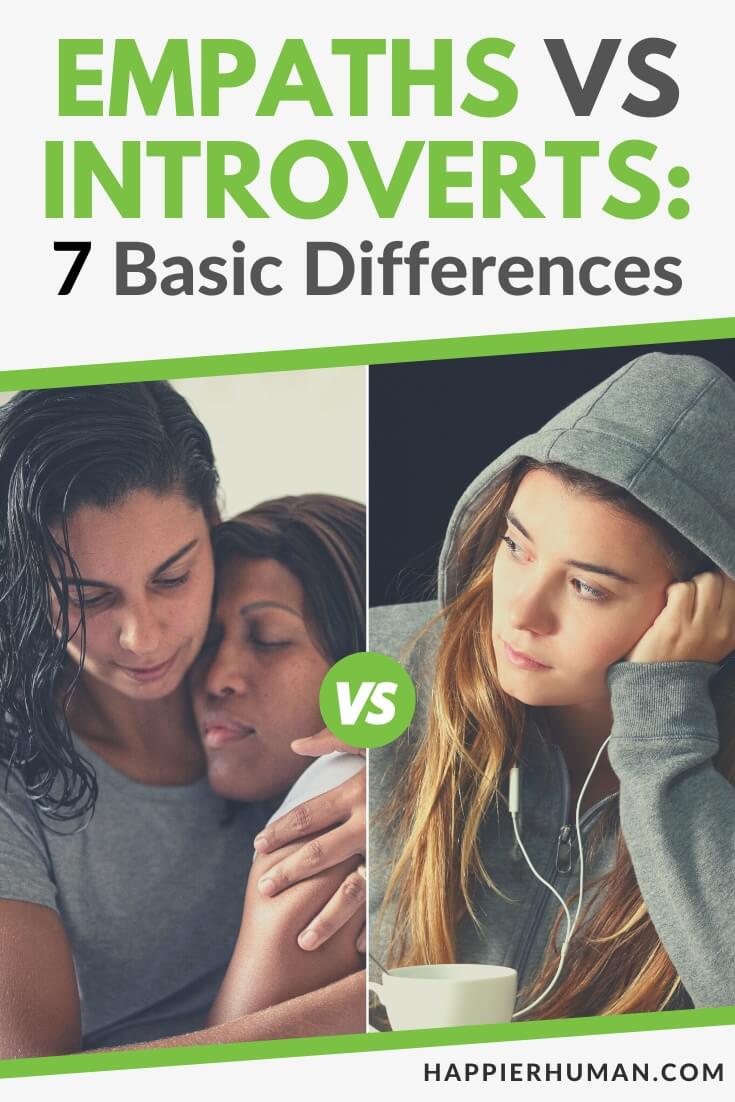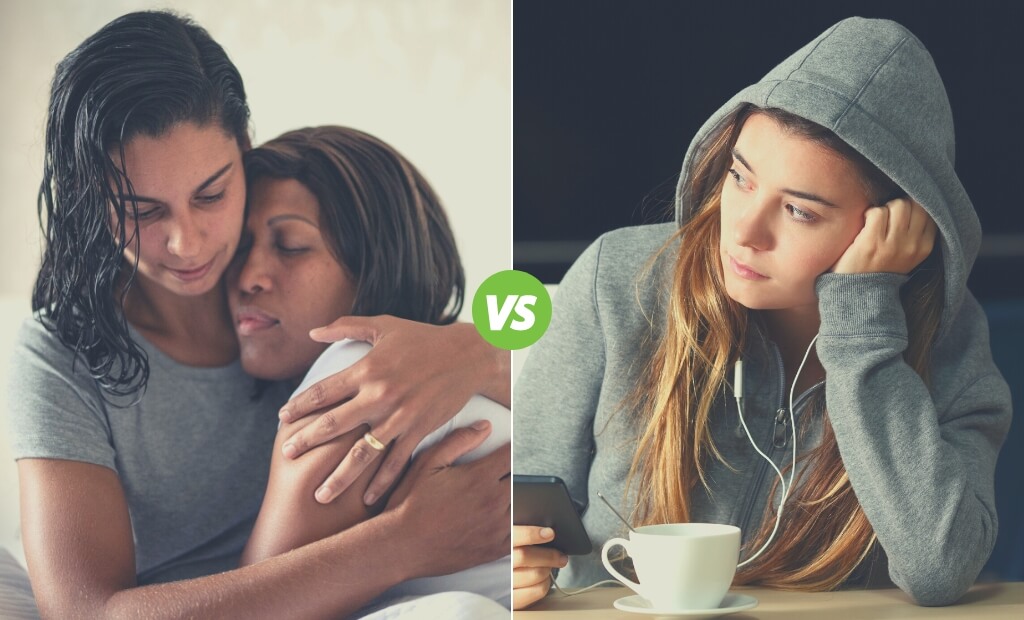I’m an empathic ambivert. Because I am an empathic ambivert, I can function well in groups or on my own. I am also sensitive to what people feel, and I have a rather uncontrollable ability to see what people feel and “wear their shoes” without wanting to.
Yes, there are times I really wish I could just shut that side off and not care about what people feel or what motivates them.
However, a newcomer to our social circle recently asked me if I meant to say that I’m an introvert, because “aren’t introverts and empaths the same?”
Having explained that empath vs introvert isn’t the same thing many times, I smiled tolerantly (yeah, I wanted to scream, ‘coz her comment was like saying that blue and red are the same). While blue and red are both colors, they aren’t the same.
So, just what are the differences between empaths and introverts? And why are these not always the same thing? Here’s what you need to know.
What Is an Empath?
You’ve probably heard about the concept of being empathic and feeling the emotions of others. If you’re an empath, you are sensitive to what others feel, and you instantly feel a need to help others heal.
What few people realize is that an empath is so aware of what others feel that they internalize those feelings, and those feelings become their own. It’s the emotional equivalent of someone sneezing and you catch their cold.
As an empath, you often know what someone feels before they even know it. You may be so attuned to the feelings of others that it can become confusing and exhausting to you as you struggle to know what feelings are yours and which are theirs.
What Is an Introvert?
An introvert is someone who has a greater sensitivity to stimulation, which means they are more stimulated and triggered by people than those who are extroverts.
An introvert doesn’t like large crowds, and they try to avoid socializing and small talk.
Introverts often feel uncomfortable in crowds and social settings as they struggle to identify with other people. They feel like outsiders and find it difficult to relate to others.
When people have a strong emotional reaction, an introvert’s instinct is to run away and not get involved, especially if it happens in large crowds. Anger, pain, and fear often drive an introvert away.
Are an Empath and an Introvert the Same?
People sometimes use the term introvert and empath interchangeably, but these two are not the same. True, many introverts are empaths, but you also get extroverted empaths. However, an empath and an introvert aren’t always mutually inclusive.
There are a number of differences between being introverted and being empathic.
7 Differences: Empath VS Introvert
Empaths and introverts are qualities that one person can have, and being an introvert can increase the likelihood of you being an empath, but this is not always the case.
Here, I’d like to explain the differences between someone who is an introvert (but not an empath) and an empath (who isn’t necessarily introverted).
1. Relating to People
Introverts and People
Introverts who are not empaths tend to avoid large groups because they feel like they can’t identify with those people and they feel intimidated by the stimulation of being surrounded by so many people and diverse views and opinions.
As an introvert, you probably feel as if you just don’t fit into the puzzle that’s society.
Relating to people isn’t a skill that introverts master easily, and they tend to focus their attention inward.

Instead of taking time to study people around you and find a connection point, you may choose to think about other things instead of working at belonging.
Empaths and People
Empaths are different in that they avoid large groups because they identify too deeply with the emotional burden that people carry.
An empath sees to the heart of people, not just understanding the struggle that someone carries (but doesn’t speak of), but they are also able to position themselves so they see life from the other person’s perspective.
When you can’t just switch off that ability to really see, feel, and care, it can become unpleasant to deal with many people at the same time. This is why empaths may avoid crowds, not because they don’t like people or struggle to relate to them.
2. Staying or Leaving Situations
Introverts and Leaving
When a situation becomes mentally and emotionally taxing, an introvert may want to run for the hills so they can protect themselves and because they aren’t emotionally invested in the people around them.
Leaving is how an introvert avoids the feelings of discomfort when they have to associate with people they’re not comfortable with.
An introvert keeps one foot out the door, and they are always ready to leave when a situation becomes too much for them.
Empaths and Caring
Unlike an introvert that tries to avoid people because they don’t identify with them, an empath cares deeply, which is why the empath will try to help people, no matter how much helping hurts.
Empaths are naturally drawn to help people and try to improve their lives because they identify so deeply with them.
Therefore, while introverts don’t identify with people and want to leave, an empath can relate to each emotion and experience of someone else, which is why they want to help them.
3. Keeping People out with Boundaries
Introverts and Boundaries
An introvert establishes boundaries built around their discomfort. They keep people out by not socializing or attending events where many people gather, as these kinds of interactions make the introvert all the more aware of how little they identify with people.
Introverts use boundaries to protect them from feeling ostracized.
Empaths and Boundaries
Where an introvert may leave early when they feel a situation becomes too much for them, an empath struggles to say no.
People will manipulate an empath into situations that make them feel uncomfortable, but the empath won’t leave because they feel like they have to help, even if helping causes problems for them.

I think here of the many times I’ve been pushed to help people, even to the point of feeling utterly used up, because I could see what people felt, and I usually feel sorry for them.
To survive, an empath may learn to create boundaries because they realize they can’t help everyone and they can’t feel for everyone. The trick is to withdraw before they feel for others.
4. Wanting to Heal Others vs Wanting to Fit in
Introverts Want to Fit in
Do you wish deep inside that you could just be the Belle of the ball for once in your life? Introverts secretly wish they could have as much fun as everyone else seems to have when out socializing, but they are also intimidated and afraid of exposing their “social ineptness” at large gatherings.
An introvert can socialize effectively in small groups, but larger groups overwhelm them, and they soon become very aware of how poorly they fit in.
Empaths and Healing Others
Where introverts want to fit in, an empath wants to help fix people. They see the brokenness of the people around them and wish they could help.
Instead of working toward being accepted, an empath tries to heal and repair. Empaths are more likely to hug people than introverts would.
5. Energy Drain Vs Emotional Exhaustion
Introverts Get Tired from Being Overwhelmed
When the “world is too much with us” as Wordsworth said, an introvert gets physically and mentally drained. This is usually when the introvert withdraws and seeks their own company so they can recharge and rest.
Being people-stimulated, an introvert may head out into the country to fill up their tank of peace again.
Empaths Become Emotionally Bankrupt
Unlike introverts who get mentally and physically drained by being around people because people trigger them, an empath suffers emotional drain from spending all their feelings on the other person, leaving them emotionally bankrupt.
Spending all their care and compassion on other people, empaths have nothing left for themselves. Emotional exhaustion may then force them to withdraw and isolate so they can recover.
6. Environmental and Emotional Sensitivity
Introverts Retreat in “Cold” Environments
Introverts tend to be more emotionally sensitive than extroverts, which is why people easily think they are automatically empathic.
Exposure to an environment that’s “cold” and unwelcoming, where there are too many people, and it’s just too busy can make an introvert withdraw into their inner shell for protection.

While being in such an environment may be upsetting to the introvert, they can find solace in their mind’s world.
Empaths Suffer in “Cold” Environments
An empath is sensitive to the emotional aspect of an environment. When they are placed somewhere that there has been previous emotional strain and trauma, or walk into a room where people avoid each other so much that it’s seeped into the walls, they feel it like a physical blow.
While an introvert can withdraw inward, an empath feels responsible for fixing the unfixable. A space that has a cold energy will feel like a war zone to an empath, and like a sin-eater, they are obliged to stay.
7. Observation Vs Participation
Introverts Prefer to Be Alone and Watch
Introverts prefer alone time, and they also tend to observe, never fully committing to outsiders or people unless those people are already in the introvert’s inner circle (which is usually only one or two other people).
An introvert is less likely to participate in discussions and social interaction. They are often categorized as being aloof. They are on the outside and look in (but mostly, they look away).
Empaths Participate and Attach Quickly
Empaths quickly identify with someone based on how well the empath reads people and internalizes the other person’s feelings. Soon, the empath begins to feel responsible for the people they interact with, which can lead to an unhealthy attachment.
Unlike introverts, the empath is also on the outside, but they feel the inside of people’s hearts and feelings.
Final Thoughts on Empath Vs Introvert
Introverts and empaths are similar, but they are not the same. However, introverts are more naturally drawn to become empaths.
An empath feels people right down to their own bones, and it can be a traumatic journey. Introverts tend to avoid people since they are sensitive but always feel like they don’t fit in.
Empaths often suffer for feeling so deeply, and while introverts easily withdraw, empaths end up feeling stuck in a situation that hurts them. It’s a far better combination to be both an introvert and an empath.
This way, you can feel and be sensitive to the emotions of others, but you also realize it’s not up to you to stay when you feel you don’t belong.
For more on how to withdraw and focus inward to protect yourself from the emotional overload of others, read my guide on journaling and self-care.
And if you're looking for more articles about introverts and/or empaths, be sure to check out these blog posts:
- 7 Benefits of Showing Empathy Throughout Your Life
- 11 Reasons Empaths Form Relationships with Narcissists
- 21 Quicks Ways You Can Recharge as an Introvert
Finally, if you want to identify YOUR personality type, then take one of these 11 personality tests to better understand what makes you tick.


